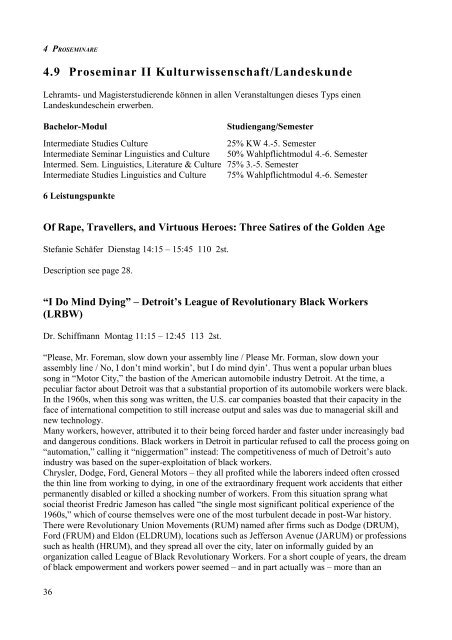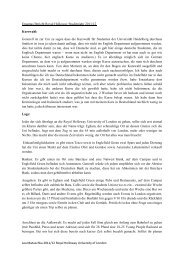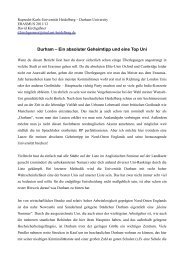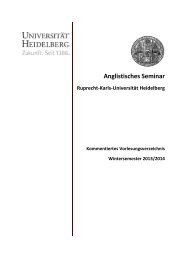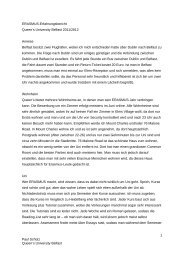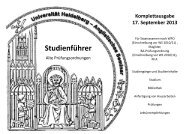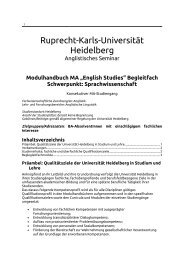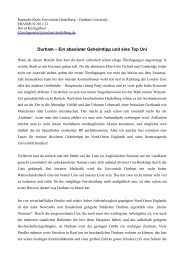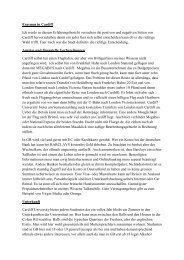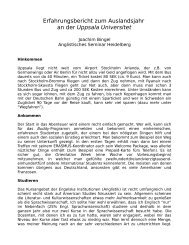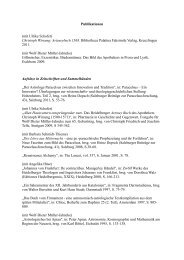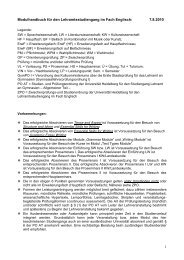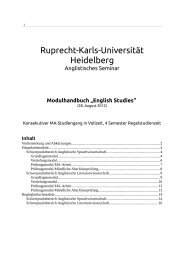Kommentiertes Vorlesungsverzeichnis Anglistik Heidelberg SS 2008
Kommentiertes Vorlesungsverzeichnis Anglistik Heidelberg SS 2008
Kommentiertes Vorlesungsverzeichnis Anglistik Heidelberg SS 2008
Create successful ePaper yourself
Turn your PDF publications into a flip-book with our unique Google optimized e-Paper software.
4 PROSEMINARE<br />
4.9 Proseminar II Kulturwissenschaft/Landeskunde<br />
Lehramts- und Magisterstudierende können in allen Veranstaltungen dieses Typs einen<br />
Landeskundeschein erwerben.<br />
Bachelor-Modul Studiengang/Semester<br />
Intermediate Studies Culture 25% KW 4.-5. Semester<br />
Intermediate Seminar Linguistics and Culture 50% Wahlpflichtmodul 4.-6. Semester<br />
Intermed. Sem. Linguistics, Literature & Culture 75% 3.-5. Semester<br />
Intermediate Studies Linguistics and Culture 75% Wahlpflichtmodul 4.-6. Semester<br />
6 Leistungspunkte<br />
Of Rape, Travellers, and Virtuous Heroes: Three Satires of the Golden Age<br />
Stefanie Schäfer Dienstag 14:15 – 15:45 110 2st.<br />
Description see page 28.<br />
“I Do Mind Dying” – Detroit’s League of Revolutionary Black Workers<br />
(LRBW)<br />
Dr. Schiffmann Montag 11:15 – 12:45 113 2st.<br />
“Please, Mr. Foreman, slow down your assembly line / Please Mr. Forman, slow down your<br />
assembly line / No, I don’t mind workin’, but I do mind dyin’. Thus went a popular urban blues<br />
song in “Motor City,” the bastion of the American automobile industry Detroit. At the time, a<br />
peculiar factor about Detroit was that a substantial proportion of its automobile workers were black.<br />
In the 1960s, when this song was written, the U.S. car companies boasted that their capacity in the<br />
face of international competition to still increase output and sales was due to managerial skill and<br />
new technology.<br />
Many workers, however, attributed it to their being forced harder and faster under increasingly bad<br />
and dangerous conditions. Black workers in Detroit in particular refused to call the process going on<br />
“automation,” calling it “niggermation” instead: The competitiveness of much of Detroit’s auto<br />
industry was based on the super-exploitation of black workers.<br />
Chrysler, Dodge, Ford, General Motors – they all profited while the laborers indeed often crossed<br />
the thin line from working to dying, in one of the extraordinary frequent work accidents that either<br />
permanently disabled or killed a shocking number of workers. From this situation sprang what<br />
social theorist Fredric Jameson has called “the single most significant political experience of the<br />
1960s,” which of course themselves were one of the most turbulent decade in post-War history.<br />
There were Revolutionary Union Movements (RUM) named after firms such as Dodge (DRUM),<br />
Ford (FRUM) and Eldon (ELDRUM), locations such as Jefferson Avenue (JARUM) or professions<br />
such as health (HRUM), and they spread all over the city, later on informally guided by an<br />
organization called League of Black Revolutionary Workers. For a short couple of years, the dream<br />
of black empowerment and workers power seemed – and in part actually was – more than an<br />
36


